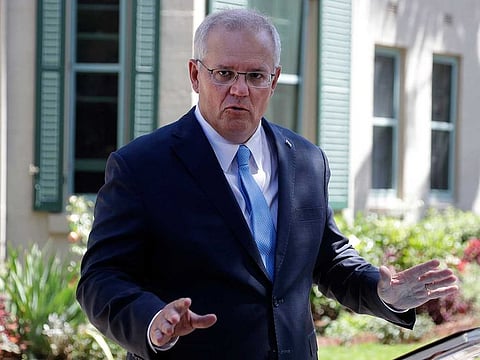India, Australia to sign interim free trade deal on Saturday
Deal will eliminate 85 per cent tariffs on Australian goods exports to India

Canberra: After years of negotiations, Australia and India will sign an interim free trade deal on Saturday which will eliminate 85 per cent tariffs on Australian goods exports to India.
The deal with India unlocks a market of almost 1.4 billion consumers and would strengthen Australia’s economy.
“This agreement opens a big door into the world’s fastest-growing major economy for Australian farmers, manufacturers, producers and so many more,” said Australian Prime Minister Scott Morrison in a statement.
The Australia-India Economic Cooperation and Trade Agreement will be signed on Saturday in a virtual ceremony by Trade Minister Dan Tehan and India’s Minister of Commerce and Industry, Piyush Goyal, Australia said in a statement on Friday night.
Morrison and India’s Prime Minister Narendra Modi will witness the signing of the interim agreement, and both countries would continue to work towards a full free trade deal.
“After more than a decade of protracted negotiations, Australia and India will sign an interim free trade deal on Saturday. It’s a more comprehensive agreement than some anticipated and will be registered with the WTO like a full free trade agreement (FTA),” tweeted Stephen Dziedzic, Foreign Affairs (Asia Pacific) reporter, Australian Broadcasting Corporation, based in Parliament House, Canberra.
The Australian government said that the deal will eliminate tariffs on more than 85 per cent of Australian goods exports to India, rising to almost 91 per cent over 10 years.
The Australian government is pointing to benefits for a wide range of producers. It said that the tariffs will be eliminated on a number of Australian goods including sheep meat, wool, fresh rock lobsters and some metallic ores.
Tariffs to be reduced to zero more gradually for other Australian exports for example avocados, nuts, several beans, cherries and a host of berries. Meanwhile, tariffs were reduced (not eliminated) for Australian wine.
But some key sectors are still excluded. Australia has refused to give ground on waiving labour market testing.
“Again, not a huge surprise. The government instead unveiled some modest “labour mobility” measures for Indian graduates,” said Dziedzic.
“That includes opening up 1000 working holiday visas to Indian backpackers. The Government will also allow top Indian IT, Engineering, Mathematics and Science graduates to stay slightly longer in Australia post-study,” added Dziedzic.
However, Australia has not been able to convince India to tear down barriers to Australian goods in sensitive sectors including chickpeas, and dairy- they are excluded.
“This agreement has been built on our strong security partnership and our joint efforts in the Quad, which has created the opportunity for our economic relationship to advance to a new level,” Morrison said, referring to the security grouping of India, Australia, United States and Japan.
Canberra exported Australian dollar 19.3 billion worth of goods to India in 2021, representing 4.2 per cent of Australia’s total exports.
Sign up for the Daily Briefing
Get the latest news and updates straight to your inbox



